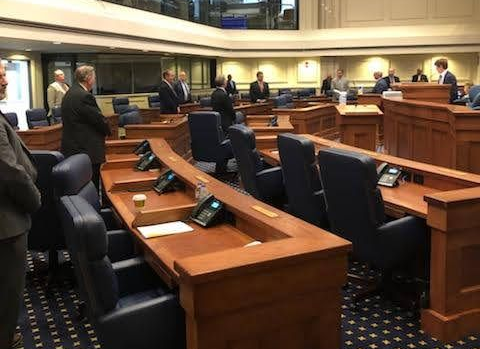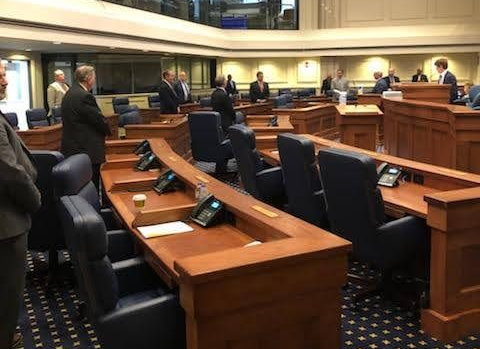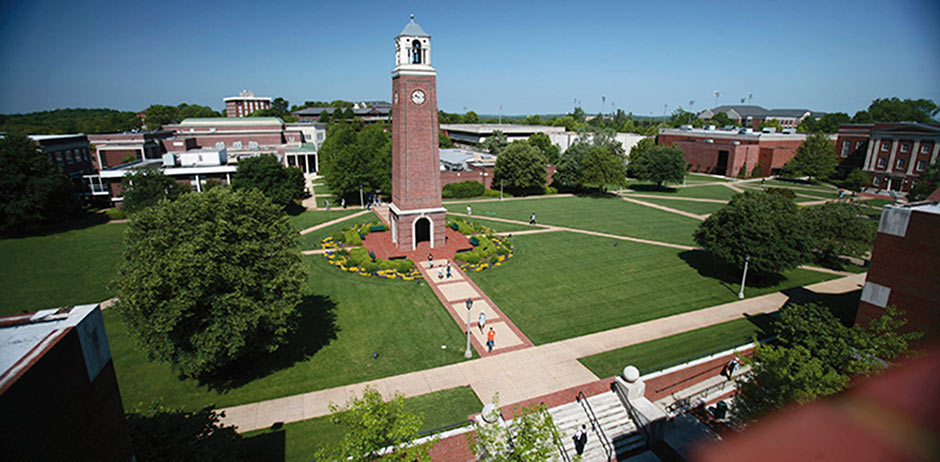Senate rejects due process for student discipline bill

On Tuesday, the Alabama Senate voted to reject controversial legislation that would have set up a formal due process standard for disciplining a child in an Alabama public school. Senate Bill 181 (SB181) is sponsored by State Senator Rodger Smitherman. The synopsis states, “This bill would provide a uniform statewide system of procedural due process protections relating to the suspension and expulsion of public school students for violating the student code of conduct or state law. This bill would also provide for the adoption of any necessary rules to implement this act by the State Board of Education.” The bill, after being amended, was voted down rapidly with no floor debate. Smitherman then took an hour of time during the next bill to voice his unhappiness with the Senate’s rejection of his legislation. “Last year, we passed the same bill out of the Senate almost unanimous,” Smitherman said. Last year the legislation failed in the House of Representatives. The legislation was staunchly opposed by Alabama School Superintendents and other education supporters. “It is obvious they did a good lobbying effort among our colleagues to kill the bill,” Smitherman said. “The school superintendents, they have elevated their power now to the point that they can convince all but eleven people that these children do not need due process.” “Those little children ain’t going to have anybody standing out there (in the Statehouse halls) talking for them,” Smitherman said. “Who is getting suspended? Who is getting so many days? and for what reason?” Smitherman said heavily, implying that school systems target Black students, particularly males, for discipline. “The teacher is the judge, jury, and executioner,” Smitherman said. “They (the accused children) don’t get the first benefit of the doubt,” Smitherman said. “They are guilty until they are proved innocent.” The most controversial element of Smitherman’s legislation was giving a student the right to face their accuser. The Greene County Superintendent testified before committee that students fear retaliation by other students, so a student who might tell a teacher that another child has a gun in school; would not come forward if her identity was revealed. Smitherman also opposes the mandatory kindergarten bill that would force a child who did not attend kindergarten as a five-year-old to be denied admission into first grade. He also opposes the Alabama Literacy Act provision that a child that can’t read at grade level by the end of the third grade will have to repeat third grade. “First, they want to hold them back in the first grade,” Smitherman said. “If they don’t get them there, then they want to hold them back in third grade. If they don’t get them there, then they use these discipline policies to suspend or expel them.” “They ain’t going to stay in school when they are 21,” Smitherman said. “If they don’t get an education, they ain’t gonna get a job. If they have no job, they can’t eat.” Smitherman called the schools a “pipeline to prison.” The Legislature is also concerned with criminal gangs operating within many Alabama schools. The Senate voted down SB181 11 to 20. Jabo Waggoner, Tom Butler, Arthur Orr, and Greg Reed were the only Republicans to vote for the bill. Billy Beasley was the only Democrat who voted against the legislation. The controversial legislation appears to be dead for this session. To connect with the author of this story or to comment, email brandonmreporter@gmail.com.
Senate passes legislation to create new judgeships

On Thursday, the Alabama Senate passed legislation creating four additional circuit judgeships and three additional district judges. Senate Bill 39 (SB39) is sponsored by Sen. Sam Givhan (R-Huntsville). The legislation creates four new circuit judgeships in the 23rd Circuit (Madison County), the 28th (Baldwin County), the 19th (Autauga, Chilton, and Elmore counties), and the 37th (Lee) as well as three additional district judgeships in Baldwin, Mobile, and DeKalb counties. Alabama has grown over the years in population, but the number of circuit and district judges in Alabama has not increased at the same pace. This means higher case dockets for most of the judges the state has, which translates into divorces, civil litigation, and even criminal trials being postponed as overworked courts cannot expedite trials, hearings, and other work. Chief Justice Tom Parker told a reporter two years ago that the state needed 21 more judges. The Legislature addressed this in 2015 when they passed a plan to reallocate judgeships. The plan was to reallocate judgeships to growing areas of the state, like Shelby County, Madison County, and Baldwin County, from declining or stagnant areas of the state, like Montgomery County, Jefferson County, and the Black Belt. When a judgeship was vacated due to death, retirement, or removal from the bench the Reallocation Commission was to have ordered that vacant judgeship reallocated from where the need was lesser to where it was greater. That was not popular with the judges and has not happened with great regularity. At the assistance of Senator Rodger Smitherman (D-Birmingham) and the Alabama Judges Association, SB39 would put a moratorium on the reallocation of judges until 2027. The new judgeships would be filled by elections in 2024, with the new judges going into office in the second week of January 2025. This means that the fiscal year 2024 state general fund budget (SGF) that passed the House three weeks ago, which included no additional money for judges, will not need to be amended heavily if SB39 becomes law. According to the fiscal note, passage of SB39 will cost the state $2.1 million in 2025 and at least $2.9 million a year beyond that. The effect on the SGF will be $1.9 million in FY2025 and $2.5 million in FY2026 and beyond. An earlier version of the bill created a new circuit judge in the eleventh circuit (Lauderdale County) instead of the thirty-seventh (Lee County). The substitute version that passed the Senate on Thursday eliminates that new circuit judgeship and moves that circuit judgeship to the thirty-seventh – though that change does not appear in the fiscal note. The new circuit in the 19th circuit may reside in any county within the Nineteenth Judicial Circuit (Chilton, Autauga, or Elmore counties). The judge occupying Judgeship Number 4 shall be assigned to the domestic relations division of the circuit. The initial judges elected to the additional judgeships created by SB39 shall serve for a six-year term, holding office from the first Monday following the second Tuesday in January after the general election at which the judges are elected. SB29 also orders the Administrative Office of Courts to provide the following statistics for each fiscal year by circuit: (1) Number of civil cases filed broken down by category. (2) Number of civil cases resolved via a motion to dismiss or voluntary dismissal. (3) Number of civil cases resolved via a motion for summary judgment. (4) Number of civil cases in which a jury is empaneled. (5) Number of civil cases tried to a jury verdict. (6) Number of criminal cases filed broken down by type of offense. (7) Number of total criminal counts filed broken down by type of offense. (8) Number of criminal cases resolved via dismissal. (9) Number of criminal cases resolved via plea agreement. (10) Number of criminal cases resolved via some form of pre-trial diversion or alternative resolution program. (11) Number of criminal cases in which a jury is empaneled. (12) Number of criminal cases tried to a jury verdict. (13) Number of juvenile cases filed broken down by dependency and delinquency. (14) Number of juvenile cases resolved. (15) Number of domestic cases filed broken down by category. (16) Number of domestic cases resolved. (17) Number of probate cases appealed to the circuit court. (18) Any other information or data deemed relevant by the Alabama Supreme Court. That information shall be provided to all of the following by January 15 of each year: (1) The Speaker of the House of Representatives. (2) The President Pro Tempore of the Senate. (3) The chair of the Senate Finance and Taxation, General Fund Committee. (4) The chair of the House Ways and Means General Fund Committee. (5) The chair of the Senate Judiciary Committee. (6) The chair of the House Judiciary Committee. (7) The Legislative Fiscal Officer. (8) The chair of the Legislative Council. (9) The vice chair of the Legislative Council. (10) The Senate Minority Leader. (11) The House Minority Leader. The bill, as substituted, passed the Alabama Senate in a vote of 33 to 0. It moves to the Alabama House of Representatives for their consideration. Speaker of the House Nathaniel Ledbetter (R-Rainsville) previously told Alabama Today that he and the House were in favor of legislation addressing the state’s judge shortage. Thursday will be day 21 of the 2023 Alabama Regular Legislative Session. The House convenes at 1:00 p.m. To connect with the author of this story or to comment, email brandonmreporter@gmail.com.
Alabama Senate OKs ban on trans athletes at a college level

Alabama could soon join other states that ban transgender women from playing on female sports teams in college, under legislation nearing final approval in the state. State senators voted 26-4 on Wednesday for the House-passed legislation that extends a 2021 ban on transgender athletes on K-12 sports teams to also include college teams. The bill now returns to the Alabama House of Representatives, where lawmakers must decide whether to accept a minor change to the bill. The bill is part of a wave of restrictions on transgender people being pushed in conservative states. At least 20 other states have now imposed restrictions on transgender athletes at the K-12 or collegiate level, or both. Supporters said transgender women have an unfair advantage in competition. “They are bigger than women. They are stronger. They’re faster. They have larger hearts, denser bones, stronger muscles,” Republican Sen. April Weaver, of Brierfield, said. “I don’t think that is something any hormone therapy can undo.” Opponents have said the bills are about shaming transgender people and are rooted in discrimination and politics. An advocacy group urged Ivey to veto the bill when it comes to her desk. “HB 261 is part of a coordinated effort by extremist politicians trying to advance their anti-LGBTQ+ agenda. These politicians know that state and university sports leagues already have their own governing bodies to determine the best regulations that work for their students. And, they know that an outright ban on transgender athletes exacerbates discrimination against LGBTQ+ people, is not based on the facts, and does not help women’s sports,” said Carmarion D. Anderson-Harvey, Alabama director of the LGBTQ+ advocacy group Human Rights Campaign. The bill states that sports teams “designated for females, women, or girls shall not be open to a biological male.” Similarly, a “biological female” would also not be allowed to participate on teams for boys and men. Democratic Sen. Rodger Smitherman, of Birmingham, asked Weaver how a school would know a person’s gender at birth. Weaver replied that the person’s original birth certificate would suffice. The bill has faced nominal opposition in the Alabama Legislature. The bill cleared the House of Representatives on an 83-5 vote, with more than a dozen members abstaining on the vote. Republished with the permission of The Associated Press.
Legislature votes to ban exhibition driving

On Tuesday, the Alabama State Senate voted in favor of legislation outlawing street racing and other forms of exhibition driving, such as tire burnouts and doing donuts with a motor vehicle. State Representative Allen Treadaway sponsored House Bill 29 (HB29). HB29 was carried in the Senate by Sen. Rodger Smitherman, who sponsored the Senate version of the bill. Smitherman explained to the Senate that Rep. Treadaway is a former City of Birmingham Deputy Police Chief and is sponsoring the same legislation in the Alabama House of Representatives. “I don’t have a problem with the House bill,” Smitherman said. “It is the same bill.” “There have been several instances of people getting hurt through this dangerous driving,” Barfoot said. “I have been almost run over,” said Sen. Shay Shelnutt. “I have seen this problem personally in our county.” The Alabama Big 10 Mayors have endorsed legislation to impose criminal penalties on exhibition driving. “This is something that the Mayor of Birmingham and the Mayor of Hoover asked us to support,” Rep. Susan Dubose said. “We have had 16 persons and a baby killed by a Dodge Charger that was doing donuts with a crowd watching.” “In our area, we have had four people killed,” Smitherman said. “Currently, all you can do is misdemeanors.” “Exhibition driving” is when a driver purposefully drives intentionally to create unnecessary engine noise, tire skids, burnouts, and other dangerous and dangerous and damaging driving techniques. This growing problem across Alabama cities creates a public safety hazard for pedestrians and other drivers while draining limited law enforcement resources. A first violation shall be guilty of a Class C misdemeanor. A second or subsequent violation shall be guilty of a Class B misdemeanor. In addition, the court may prohibit the person from driving a motor vehicle on the public highways of this state for a period not exceeding six months. If a person operating a motor vehicle violating this ban causes bodily injury to another individual, or the offense proximately causes damage to any property, the person shall be guilty of a Class A misdemeanor. In addition, the court shall prohibit the person from operating a motor vehicle on the public highways of this state for six months. If a person violates this ban and, in the commission of this act, causes serious physical injury to a person other than the driver, the person shall be guilty of a Class C felony. In addition, the court shall prohibit the person from operating a motor vehicle on the public highways of this state for two years. If a person commits a violation of this law and the commission of the offense proximately causes death to any person, the person shall be guilty of a Class B felony. In addition, the court shall prohibit the person from operating a motor vehicle on the public highways of this state for not less than two years. HB29 passed the Senate 33 to 0. The legislation now goes to Gov. Kay Ivey’s desk for her consideration. Wednesday will be day 17 of the 2023 Alabama Regular Legislative Session. To connect with the author of this story or to comment, email brandonmreporter@gmail.com.
Senate committee advances education reform legislation

On Wednesday, the Alabama Senate Education Policy Committee advanced legislation with several educational goals – including requiring that future Alabama High School seniors must meet at least one college or career-ready benchmark to graduate. House Bill 109 (HB109) is sponsored by State Representative Terri Collins. Collins explained that HB109 is omnibus legislation that includes three acts: the Alabama Credential Quality and Transparency Act, the Alabama Terminal on Linking and Analyzing Statistics on Career Pathways Act, and the Alabama College and Career Readiness Act. “They are based on the recommendations of the Alabama Workforce Task Force,” Collins told the Committee. The Career Pathways Act would let students see what the high demand job in their area are and what it takes to get those jobs,” Collins explained. “And hopefully grow our labor participation rate.” Collins explained that students must complete at least one benchmark for college or career-ready standards. To prove college readiness, that could be a high score on the ACT, completing an advanced placement course, or completing a dual enrollment course. For military readiness, the benchmark could be taking the ASVAB test. Career readiness could be completing an apprenticeship, receiving a skills credential, or completing other skills training. Collins said, “In order to graduate in 2025, you would either have to be college ready or be career ready.” State Senator Donnie Chesteen is the chair of the Education Police Committee. Chesteen said there was a committee amendment to the bill. Collins said, “The original bill said that the college and career-ready part of this had to be in place by 2024-2025. The amendment puts that back to 2025-2026.” Chesteen said, “Moving the start date back to 2026 is important for those who may have slipped through the cracks. Thank you for working with us on this amendment.” Sen. Rodger Smitherman said, “I like this bill. I was an orderly. We don’t have orderlies now – we have LPNs. The advantage was that I was career-ready when I graduated from high school. I was working while in high school.” To make it easier for employers and workers to navigate the increasingly complex system of credentials needed to apply for positions in the 21st-century economy, the bill creates a free searchable public online registry of educational and occupational credentials. The act includes restrictions on releasing personally identifiable information, including procedures for handling data breaches. The Committee voted to give HB109 a favorable report on an 8 to 0 vote. The full Senate could consider the amended bill as early as Tuesday. Tuesday will be day 11 of the regular session. The Legislature is limited by the Alabama Constitution to no more than thirty legislative days during a regular session. To connect with the author of this story or to comment, email brandonmreporter@gmail.com.
Adoption bill passes Senate with vaccination amendment attached

On Thursday, the Alabama Senate passed legislation simplifying Alabama’s complex adoption laws, speeding up the process of children finding permanent homes. The Senate included an amendment that would allow families with vaccine skepticism to be able to be involved in the foster care program. House Bill 101 is sponsored by State Rep. Ginny Shaver. The adoption reform legislation was carried in the Alabama Senate by State Senator Arthur Orr. “This is a Law Institute (ALI) bill,” Shaver said when the bill was in committee. “I started working on a bill and found out that they already had a committee working on rewriting the state’s adoption code.” Shaver explained that the Alabama Law Institute had a committee of judges and lawyers who met on a conference call every two weeks for the last four years to modernize and improve Alabama’s existing adoption statutes. “Alabama’s adoption law has not been touched in 30 years,” Shaver said. The rewritten 80-page bill “is very comprehensive and detailed.” Shaver said that the new legislation divided minor adoptions versus adult adoptions. It also clarifies which court is the proper court, allows courts handling adoptions to work together and communicate, allows for electronic communication, provides rules for a contest of adoptions in certain situations, and clarifies procedures about relatives and stepparents who adopt a minor. Orr did add some amendments in the Senate. The first was a “technical amendment” and came from ALI and Shaver. “This came from ALI and Rep. Shaver, the sponsor,” Orr explained. “It cleaned up some wording about grandparents.” The second amendment deals with vaccinations and was negotiated by Orr with the Alabama Department of Human Resources (DHR). “I spent a good while talking to Commissioner [Nancy] Buckner, and she and the Department support this,” Orr said. “It is not the same amendment that was offered in the House that there was some controversy about.” “The Department of Human Resources shall provide by rule the process through which an individual seeking to participate in foster care or adoption may apply for an exemption from any vaccination requirement for religious or other appropriate reason for himself, herself, or any other individual in his or her household.” The Senate adopted both of the amendments. “This has been a long time coming,” Orr said of the legislation. “We will move children more rapidly through the process of adoption and will remove needless hurdles.” Sen Rodger Smitherman said, “I want to commend ALI. ALI is a collection of legal minds from all over the state.” “I am on the ALI board of directors, so I got to see the committee work on this,” Smitherman said. Orr said that the legislation has “lots of changes” to Alabama’s adoption laws “that will certainly expedite the process.” “I would like to thank DHR. They have a lot of challenges,” Orr said. The Senate voted to pass HB101 30 to 0. The legislation now goes back to the Alabama House of Representatives for them to consider the changes that were made by the Senate. The Legislature will return on Tuesday for the 11th legislative day of the 2023 Alabama Regular Legislative Session. To connect with the author of this story or to comment, email brandonmreporter@gmail.com.
Senate passes legislation to ban exhibition driving

On Thursday, the Alabama State Senate voted in favor of legislation outlawing street racing and other forms of exhibition driving, such as tire burnouts and doing donuts with a motor vehicle. Senate Bill 58 (SB58) is sponsored by State Sen. Rodger Smitherman. Smitherman is a Democrat from Birmingham. “In our area, we have had four people killed,” from racing Smitherman said. “Currently, all you can do is misdemeanors. Sen. Will Barfoot spoke in support of the legislation. “This really does give law enforcement the option to really clamp down on this,” Sen. Barfoot said. Smitherman said, “My house sponsor is Rep. Treadaway.” Smitherman explained that Rep. Allen Treadaway, the former City of Birmingham Deputy Police Chief, is sponsoring the same legislation in the Alabama House of Representatives. “I don’t have a problem with the House bill,” Smitherman said. “It is the same bill.” “There have been several instances of people getting hurt through this dangerous driving,” Barfoot said. “I have been almost run over,” said Sen. Shay Shelnutt. “I have seen this problem personally in our county.” The Alabama Big 10 Mayors have endorsed legislation to impose criminal penalties on exhibition driving. “Exhibition driving” is when a driver purposefully drives intentionally to create unnecessary engine noise, tire skids, burnouts, and other dangerous and dangerous and damaging driving techniques. This growing problem across Alabama cities creates a public safety hazard for pedestrians and other drivers while draining limited law enforcement resources. A first violation shall be guilty of a Class C misdemeanor. A second or subsequent violation shall be guilty of a Class B misdemeanor. In addition, the court may prohibit the person from driving a motor vehicle on the public highways of this state for a period not exceeding six months. If a person operating a motor vehicle violating this ban causes bodily injury to another individual, or the offense proximately causes damage to any property, the person shall be guilty of a Class A misdemeanor. In addition, the court shall prohibit the person from operating a motor vehicle on the public highways of this state for a period of six months. If a person commits a violation of this ban and, in the commission of this act, causes serious physical injury to a person other than the driver, the person shall be guilty of a Class C felony. In addition, the court shall prohibit the person from operating a motor vehicle on the public highways of this state for a period of two years. If a person commits a violation of this law and the commission of the offense proximately causes death to any person, the person shall be guilty of a Class B felony. In addition, the court shall prohibit the person from operating a motor vehicle on the public highways of this state for not less than two years. SB58 passed the Senate 33 to 0. The legislation now moves to the Alabama House of Representatives, where it has been referred to the House Homeland Security and Public Safety Committee. Rep. Treadaway’s companion legislation, House Bill 29 (HB29), has already received a favorable report from the committee. HB29 could be considered by the full House of Representatives as early as Tuesday. Tuesday will be day 8 of the 2023 Alabama Regular Legislative Session. To connect with the author of this story or to comment, email brandonmreporter@gmail.com.
State Senate votes to advance property tax increase for Vestavia

Vestavia Hills residents could soon be voting on whether or not to raise their property taxes after the Alabama Senate voted on Thursday to advance legislation authorizing the school system to hold a referendum on raising ad valorem taxes. Senate Bill 63 (SB63) is sponsored by State Sen. James T. “Jabo” Waggoner Jr., who chairs the powerful Senate Rules Committee. “This is on behalf of the Vestavia Hills Board of Education,” Waggoner said on the floor of the Senate. “As you know, we have one of the better school systems in the state. They are asking for 9.4 mills.” Sen. Rodger Smitherman said, “It is a tax bill, and I am going to vote for the bill.” “We did the same for Center Point,” Smitherman said. “With Center Point, we did that with street light cameras. What concerns me is that Birmingham does not get the same consideration. I had the same bill for the city of Birmingham, but I did not get the same consideration.” Senate Minority Leader Bobby Singleton said, “Thank you for bringing this bill. Education is important. I applaud you for bringing this and doing what is best for the school children in your district.” SB63 would authorize Vestavia to increase the rate at which ad valorem taxes are levied and collected by the city on all taxable property situated within the city. If passed, the bill would raise the maximum rate to $3.54 on each one hundred dollars ($100) (35.4 mills on each dollar) of assessed value. The city presently levies and collects the Special Tax at a rate of $2.56 on each one hundred dollars (25.6 mills on each dollar) of assessed value. The increase is subject to the approval of a majority of the qualified voters residing in the City who vote on the proposed increase at a special election called and held for that purpose. Singleton said that the Alabama Farmer’s Federation (without naming them) had opposed a rural tax referendum with “Vote No” signs because they don’t want to pay higher taxes on their farmland and forest land. Whether or not they will oppose this tax increase remains to be seen. SB63 was passed by the Senate in a 16 to 0 vote. SB63 is a local bill. It is customary practice in the Alabama Legislature for members who do not represent the county affected by the legislation, in this case Jefferson County, not to oppose other members’ local bills. Waggoner is the dean of the Legislature, having served in the House of Representatives for five terms from 1966 to 1984 and nine terms in the Alabama Senate from 1990 to the present. The legislation now goes to the Alabama House of Representatives for their consideration. Thursday was Day 4 of the 2023 Alabama Regular Legislative Session. To connect with the author of this story or to comment, email brandonmreporter@gmail.com
Alabama bill would limit prison release for good behavior

Incentives for some Alabama prisoners to follow the rules in order to secure an early release would be restricted under legislation that advanced in the state Senate on Wednesday. The bill slashes the amount of “good time” inmates can receive and also says inmates who commit certain offenses while in prison, including escape and sexual assault, would forfeit all of their accrued time and would be prohibited from earning any more. The Alabama Senate Judiciary Committee voted 9-4 on Wednesday to advance the bill to the full Alabama Senate, which could be voted on as soon as Thursday. Some lawmakers argued that although changes are needed, the legislation is an overcorrection and would worsen the crowded conditions in the state’s prison. About 12% of state prisoners are now eligible for “good time” incentives. Certain inmates sentenced to 15 years or fewer can earn up to 75 days of credit for every 30 days of good behavior. The bill is named after Brad Johnson, a sheriff’s deputy in Bibb County who was shot and killed in 2022. Austin Hall, the man accused of killing Johnson and shooting another deputy, had been released early from prison under good time incentives, despite escaping from a work release center in 2019. Hall served less than four years of a nearly 10-year sentence for theft, according to state records. “His killer should have been behind bars,” said the bill’s sponsor, Sen. April Weaver. The Republican from Brierfield addressed the committee while holding a photo of the slain deputy. Johnson was shot not far from Weaver’s driveway, and the senator’s husband, an emergency room physician, rushed to try to save him. Democratic Sen. Rodger Smitherman of Birmingham said good behavior incentives encourage prisoners to follow orders — otherwise, they “would have nothing to lose.” “This bill is going considerably overboard to address an individual problem we need to look at and correct,” Smitherman said. The committee rejected a suggestion by Republican Sen. Greg Albritton of Atmore to delay the implementation date. Albritton said most prisons consist of crowded dormitory-style housing in which inmates sleep in large open rooms filled with beds. “We don’t have room for people,” Albritton said. Hall, the suspect in the deputy’s shooting, could have had his good time credit revoked for the 2019 escape, but he never returned to state custody afterward, the Corrections Department said in an email last year. Instead, he was held in local jails and eventually released on bond. He has been charged with capital murder for Johnson’s killing and is being held without bond. Gov. Kay Ivey issued an executive order in January putting uniform rules on the use of good time and seeking better communication among law enforcement agencies. Republished with the permission of The Associated Press.
Legislature finishes the ARPA special session

On Thursday, the Alabama Senate voted to pass House Bill 1 (HB1), which appropriates $1,060,000,000 in federal American Rescue Plan Act (ARPA) funds for water projects, broadband, healthcare, and other projects. Following Senate passage, the Alabama House of Representatives voted to concur with the changes made by the Senate, and the bill has been sent to the governor. HB1 was sponsored by State Representative Rex Reynolds and was carried by Sen. Greg Albritton. The state has received approximately $2.1 billion in ARPA funding from the federal government. Half of that money has already been appropriated by the Legislative and is in the process of being allocated by the executive branch to projects across Alabama. This second tranche of ARPA money includes about $339,175,000 that will go for healthcare needs, including $25 million for Mental health and $9 million for the expansion of telemedicine. $260 million will be used for broadband, including a cybersecurity component. $395 million will go to water and sewer projects. $55 million will be used to compensate state agencies for the negative impacts of the COVID-19 pandemic. $1,179,000 will go for administrative costs of overseeing and allocating the money. State Sen. Arthur Orr said, “I don’t see what a lot of this has to do with COVID, but I can also see when a train is coming. “We have also got $55 million that can be for food assistance for food banks and nutritional programs,” Orr said. “I appreciate all your hard work on both of these ARPA bills,” Orr said to Albritton. “I think if we never have another ARPA, you would be happy with that.” “It does not fully fund the PEEHIP assistance, which is why the fed passed the original assistance bill,” Orr said. The full Senate voted to adopt the committee amendment introduced Wednesday for Sen. Chris Elliott. Sen. Linda Coleman-Madison offered a floor amendment to the bill. Coleman Madison said, “I would like to know why in-kind contributions was left out. It saves money from contracting out. It saves time. It helps the money go further.” “All of these moneys are under very strict guidelines by the federal Treasury Department,” Albritton said. “If we allow an in-kind contribution that opens up a means of reporting that may become problematic,” Albritton said, “We are talking about the $395 million for water and sewer projects. That is less than 40% of the total ARPA money.” “I ask that you withdraw the amendment,” Albritton said. Coleman Madison said, “I do not want to do anything where the federal government will come back and require a clawback. They want money and not any kind of service. I would like to withdraw my amendment.” Albritton provided a breakdown of the water and sewer dollars in the bill as amended by Elliott’s committee amendment. · $195 million is for water and sewer. · 100 million is water, sewer, and stormwater and may have, but does not require a match. · $100 million in water, sewer, and stormwater and does require a match “Every county in the state will have an opportunity to apply and will actually get funding for a project in their county,” Albritton told the members. “Counties across this state got $495 million directly to counties, and some of them chose to do nothing about stormwater with it,” Senate Minority Leader Bobby Singleton said. “Now they come to us and want us to fix it for them.” State Sen. Rodger Smitherman proposed an amendment to require ADEM to work with a town or county whose application was denied due to an error on the application. “This is simply to help our small towns,” Smitherman said. “If you are in a metropolitan area, you probably have someone who can do this, but our small towns cannot afford that.” “It has already been done,” Albritton objected. “That was in ARPA one. I hesitate to put that language which is already occurring in statute. I am going to vote no on this. We have already added one amendment. I don’t want another amendment one. It raises the possibility of nonconcurrence.” Smitherman’s amendment passed over Albritton’s objection 29 to 1. State Sen. Will Barfoot applauded the members for providing funding for healthcare but urged the members to do more for rural healthcare in the regular session. “I am challenging each of you here to start looking at bills to address healthcare in our rural communities,” Barfoot said. Senate Pro Tem Greg Reed said, “We have to stay focused on rural healthcare.” “We are going to have several pieces of legislation addressing nursing,” Reed said. “A lot of areas in my district, we would not have healthcare if we did not have nurse practitioners.” Reed said that broadband expansion is part of healthcare because of telemedicine. “The technology is advancing tremendously,” Reed said. “That is one way that local hospitals will be able to stay in business. We need to find ways to increase healthcare benefits, particularly in rural places like in my district.” State Sen. Vivian Figures said to Albritton, “Thank you for making sure that the cities and counties that can’t afford to put up a 35% match will be able to do these projects as well.” “I want to thank you for all the work that you have done,” Singleton said to Albritton. “It is a lot of money to spend. We have a lot of needs, but we are beginning to see a difference in the state. We are not going to be able to get it all, but we are knocking a dent in it.” “I wish you could have set aside more of the money for rural hospitals like we did in the first round,” Singleton said. “When that $40 million was cut out for them in the last round, they were ecstatic.” Reynolds asked that the House concur with the Senate changes to HB1. “The second amendment requires that ADEM has to work with a system if an application is denied because of an error,” Reynolds explained. “That system has to have an opportunity to correct that error, and if that application is denied, it has to be
Legislators seek a bailout of Birmingham Southern College

Members of the Jefferson County Legislative delegation met on Monday at Birmingham Southern College (BSC) to discuss their proposal to take $30 million of state dollars and give that to the struggling liberal arts college near Legion Field in Birmingham. The meeting was called by State Sen. Jabo Waggoner and State Rep. Jim Carns. “This plan includes a $30 million one-time infusion from the State of Alabama ($12.5 million from ARPA and $17.5 million from the Education Trust Fund). Along with smaller grants from the City of Birmingham ($5 million) and Jefferson County ($2.5 million), this infusion will cover projected deficits through May 31, 2026,” Waggoner and Carns wrote. “Without support from the state, the college will not be able to continue to operate past May 2023. Without a commitment from the state, the college will need to notify high school seniors that they will no longer be accepting applications by the middle of January.” The college released a statement acknowledging the dire straits that the school faces. “Over the past 18 months, BSC President Daniel Coleman has secured firm commitments from hundreds of private donors for $45 million toward a goal of raising $200 million by May 2026 to refresh its endowment fund. This is a remarkable demonstration of support for BSC and a reflection of the fact that the college is important—not only to Birmingham but to the State of Alabama. In order to allow sufficient time for this fund-raising effort to succeed and to give BSC breathing room to operate, we are seeking a one-time contribution of $12.5 million from the second tranche of the American Rescue Plan Act and $17.5 million from the Education Trust Fund (ETF). BSC is also asking for a commitment of $5 million from the City of Birmingham and $2.5 million from Jefferson County. We believe Birmingham-Southern College’s contributions to the greater Birmingham area and the state warrant such an investment, which is clearly permissible under state law and for which there is considerable precedent.” Coleman briefed legislators on his plan. “We believe with the time that the state funds will give us, we can gain support from the other 16,000 graduates we have not contacted as well as the many thousands of people and organizations of this state who appreciate the value of this College,” Coleman said. “Our target of $200 million of pledges by May 2026 is achievable, especially with our $45.5 million head start. Such an endowment will give us the financial stability that this college needs to thrive.” The administration blames its current financial distress on a “building program in the mid-2000s that drew heavily upon the endowment and caused the college to take on significant debt. The financial crisis of 2008-2009 and an error in the accounting of federal financial aid further depleted the college’s resources.” At the meeting on Monday, State Sen. Rodger Smitherman and State Rep. Juandalynn Givan added their bipartisan support to the bailout of the private college. “This is the urgency of now,” said Rep. Givan. “To lose Birmingham-Southern would be a travesty for all of us.” When Judson College in Marian County ran into financial trouble, the Legislature allowed the college to fail in 2021. Some Judson alums have asked why the state would bail out BSC and did nothing to save Judson. Birmingham-Southern College was founded back in 1898 as Birmingham College. Most of its students come from Alabama, and 28% self-identify as either African-American or Hispanic. In addition to potential state support, the school will need to raise about $150 million more to be back on its feet by 2026. At the meetings, the legislators said they plan to present their plan to bail out the struggling private liberal arts college to Alabama Governor Kay Ivey in the coming weeks. To connect with the author of this story, or to comment, email brandonmreporter@gmail.com.
Alabama Democratic leaders receive national recognition

Alabama State Rep. Laura Hall was recognized as the President-elect for the National Black Caucus of State Legislators (NBCSL) during the 46th Annual Legislative Conference held in Las Vegas, Nevada. Rep. Hall’s term as President will begin January 1, 2023. Alabama House Minority Leader Anthony Daniels was also recognized during the annual awards ceremony as a Regional Legislator of the Year. The awards recognize the outstanding legislative achievements and contributions made by current members of NBCSL. They are given to legislators who have exhibited extraordinary leadership and dedication to the advancement of NBCSL’s legislative agenda. “Congratulations Madam President!” Rep. Daniels wrote on Twitter. According to Alabama House Democratic Caucus Chair, Rep. Barbara Drummond, “The moment I knew that Rep. Laura Hall would assume the presidency of the National Black Caucus of State Legislators, I was Alabama proud. She represents excellence, intellect, and class. She is an Alabama jewel, moving our state forward, and now she sits at the helm of a national policy-making organization, a testament to the greatness that lies in Alabama.” Senator Merika Coleman was honored during the NBCSL convention by the National Organization of Black Elected Legislators (NOBEL) Women for her leadership in removing racist language from and streamlining the Alabama Constitution. Senator Coleman, who served as State Representative for House District 57 since 2002 before recently being elected to the Senate, received the award from Rep. Juandalynn Givan, who currently serves as the President of NOBEL Women. NBCSL membership also elected Rep. Artis “A.J.” McCampbell as an at-large member and Sen. Rodger Smitherman as Regional Chair for District 7.


